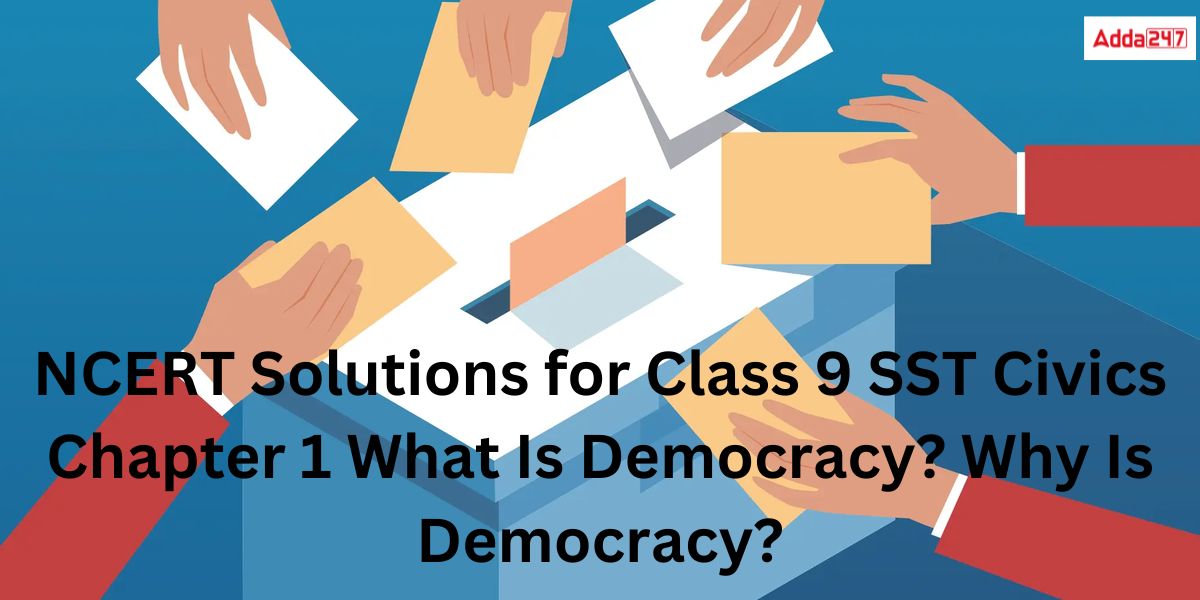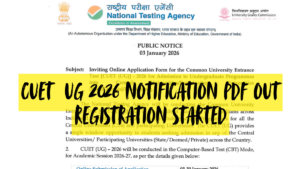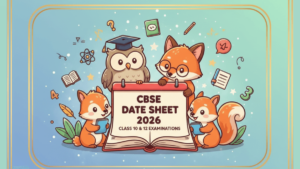NCERT Solutions for Class 9 SST Civics Chapter 1 What Is Democracy? Why Is Democracy?
NCERT Solutions for Class 9 SST Civics Chapter 1 What Is Democracy? Why Is Democracy? notes are provided in this article. NCERT Solutions for class 9 is the finest resource for getting a high score on the class 9 Examination. Adda247 Expert faculty team prepared NCERT Solutions for Class 9 SST Civics Chapter 1 What Is Democracy? Why Is Democracy? exercises of that chapter for a better grasp of the topics. These NCERT Solutions answer all questions in an easy and simple manner. These solutions will help you understand the concepts covered in the chapter completely. By writing these answers in the exam students will undoubtedly be able to achieve high scores. Keep learning with Adda247.
NCERT Solutions for Class 9 SST Civics Chapter 1 What Is Democracy? Why Is Democracy? Pdf
NCERT Solutions for Class 9 SST Civics Chapter 1 What Is Democracy? Why Is Democracy? = Pdf is given in pdf format so students can easily download it for future use. Click here to download NCERT Solutions for Class 9 SST Civics Chapter 1 What Is Democracy
Class 9 SST Civics Chapter 1 What Is Democracy? Why Is Democracy? -Video Explanation
Class 9 SST Civics Chapter 1 What Is Democracy? Why Is Democracy? -Summary
NCERT Solutions for Class 9 SST Civics Chapter 1 What Is Democracy? Why Is Democracy? – highlights the characteristics of democracy and discusses the importance of democracy as a value for our country. The ability to distinguish between a democratic and an oppressive dictatorship will be introduced.Topics and subtopics which are included in Class 9 SST Civics Chapter 1 What Is Democracy? Why Is Democracy? are
1. What Is Democracy?
- Why define democracy?
- A simple definition
2. Features of Democracy
- Major decisions by elected leaders
- Free and fair electoral competition
- One person, one vote, one value
- Summary definition
3. Why Democracy?
- Debating the merits of democracy
- Arguments against democracy
- Arguments for democracy
4. Broader Meanings of Democracy
NCERT Solutions for Class 9 SST Civics Chapter 1 What Is Democracy? Why Is Democracy? Questions with Answers
1. Here is some information about the four countries. Based on this information, how would you classify each of these countries? Write ‘democratic’, ‘undemocratic’ or ‘not sure’ against each of these.
- Country A: People who do not accept the country’s official religion do not have a right to vote.
- Country B: The same party has been winning elections for the last twenty years.
- Country C: The Ruling party has lost in the last three elections.
- Country D: There is no independent election commission.
Answer.
- Country A: Undemocratic
- Country B: Not sure
- Country C: Democratic
- Country D: Undemocratic
2. Here is some information about four countries. Based on this information, how would you classify each of these countries? Write ‘democratic’, ‘undemocratic’ or ‘not sure’ against each of these.
- Country P: The parliament cannot pass a law about the army without the consent of the Chief of the Army.
- Country Q: The parliament cannot pass a law reducing the powers of the judiciary.
- Country R: The country’s leaders cannot sign any treaty with another country without taking permission from its neighbouring country.
- Country S: All the major economic decisions about the country are taken by officials of the central bank, which the ministers cannot change.
Answer.
- Country P: Undemocratic
- Country Q: Democratic
- Country R: Undemocratic
- Country S: Undemocratic
3. Which of these is not a good argument in favour of democracy? Why?
- People feel free and equal in a democracy.
- Democracies resolve conflict in a better way than others.
- Democratic government is more accountable to the people.
- Democracies are more prosperous than others.
Answer. 4. Democracies are more prosperous than others.
The claim that democracies are more prosperous than others is not a valid justification for democracy. There are instances of democratic nations that are not as prosperous as non-democratic nations. Democratic nations like India and Sri Lanka do not enjoy the same economic strength as monarchies like Saudi Arabia and communist nations like China.
Numerous other elements, such as the availability of natural resources and governmental policy, affect a nation’s success.
4. Each of these statements contains a democratic and undemocratic element. Write out the two separately for each statement.
- A minister said that some laws have to be passed by the parliament in order to conform to the regulations decided by the World Trade Organisation (WTO).
- The Election Commission ordered re-polling in a constituency where large-scale rigging was reported.
- Women’s representation in parliament has barely reached 10 per cent. This led women’s organisations to demand one-third of seats for women.
Answer.
(a) Democratic: Passing of the laws by the Parliament.
Undemocratic: Conforming to the regulations decided by the World Trade Organisation.
(b) Democratic: The order to re-poll by the Election Commission.
Undemocratic: large scale rigging was reported
(c) Democratic: Demand by Women’s Organisation to reserve one-third seats for women.
Undemocratic: Women’s representation in parliament is less than 10 percent.
5. Which of these is not a valid reason for arguing that there is a lesser possibility of famine in a democratic country?
- Opposition parties can draw attention to hunger and starvation.
- A free press can report suffering from famine in different parts of the country.
- The government fears its defeat in the next elections.
- People are free to believe in and practise any religion.
Answer. d) “People are free to believe in and practise any religion” is not a valid reason for arguing that there is a lesser possibility of famine in a democratic country.
6. There are 40 villages in a district where the government has made no provision for drinking water. These villagers met and considered many methods of forcing the government to respond to their needs. Which of these is not a democratic method?
- Filing a case in the courts claiming that water is part of the right to life.
- Boycotting the next elections to give a message to all parties.
- Organising public meetings against the government’s policies.
- Paying money to government officials to get water.
Answer. Option 4) Paying money to government officials to get water, is not a democratic method
7. Write a response to the following arguments against democracy:
The army is the most disciplined and corruption-free organisation in the country. Therefore, the army should rule the country.
Answer: In a democracy, the people elect the government. Although the army is the nation’s most disciplined and anti-corruption organisation, it is not acceptable for them to rule. since they do not constitute a democratic government, that is, because they are not elected by the people. A military dictatorship is unfair since it violates democracy because the army was not elected by the people.
2. The rule of the majority means the rule of ignorant people. What we need is the rule of the wise, even if they are in small numbers.
Answer: The majority rule is not the rule of the ignorant. It is not required for wise people to understand the issues and perspectives of the majority of people. The majority of people have enough intelligence to understand laws and regulations. The government is administered by those who understand law and order. Everyone is the right to an equal position in how the government is formed. Therefore, it would be unfair to ignore some aspects of society.
3. If we want religious leaders to guide us in spiritual matters, why not invite them to guide us in politics as well? The country should be ruled by religious leaders.
Answer. This statement is not true. Politics and religion are two separate things. Including religion in politics can seriously polarise the population in a nation with multiple religions. Religious leaders may also cause problems for the nation because of their shared ideological differences. Religion can direct people toward religious matters, but it cannot direct people toward politics.
8. Are the following statements in keeping with democracy as a value? Why?
- Father to daughter: I don’t want to hear your opinion about your marriage. In our family, children marry where the parents tell them to.
- Teacher to student: Don’t disturb my concentration by asking me questions in the classroom.
- Employee to the officer: Our working hours must be reduced according to the law.
Answer.
- The girl is being denied the chance to express her view and select her spouse, hence the statement made is undemocratic. Every adult who is 18 years of age or older has the freedom to select their life partner under our Constitution. The daughter cannot be forced to accept the father’s or family’s choice.
- The student is not allowed to ask questions to clarify his doubts, which is against democracy.
- The statement given is one that represents democracy,because the employees are requesting their fundamental rights.Due to the fact that it calls for a legal regulation that would be advantageous to and in the employee’s best interests.
9. Consider the following facts about a country and decide if you would call it a democracy. Give reasons to support your decision.
1. All the citizens of the country have the right to vote. Elections are held regularly.
Answer: In a democratic country, the government is formed by the people, for the people and of the people. We can conclude from this that it is a democratic nation where people are free to cast votes and elect their representatives.
2. The country took loans from international agencies. One of the conditions for giving loans was that the government would reduce its expenses on education and health.
Answer: A democratic nation must prioritise its citizens’ welfare. By reducing its expenditures for health and education, the nation is fully violating democratic principles while taking a loan from international organisations.
3. People speak more than seven languages, but education is available only in one language, the language spoken by 52 per cent of people in that country.
Answer: It is not democratic to make education available in only one language. Everyone must have the right to education, and in democracies, this right is guaranteed in all languages. The majority language may also be the official language. and it is the duty of the government to ensure the language that people are familiar with.
4. Several organisations have given a call for peaceful demonstrations and nationwide strikes in the country to oppose these policies. The government has arrested these leaders.
Answer: Freedom of expression and peaceful assembly are provided by democracy. Therefore, it is undemocratic to arrest the protestors.
5. The government owns the radio and television in the country. All the newspapers have to get permission from the government to publish any news about the government’s policies and protests.
Answer. This is undemocratic since, in democracies, media and press freedom are allowed. If the government controls radio and television, this demonstrates that there is no freedom of speech or expression or the ability to criticise the government. Afterwards, it will be against press freedom
Class 9 SST Civics Chapter 1 What Is Democracy? Why Is Democracy? -Video Solution
NCERT Solutions for Class 9 SST Civics Chapter 1 What Is Democracy? Why Is Democracy? -FAQs
Q.Why is democracy Class 9?
All citizens have some fundamental rights in a democratic system, which enable them to express their opinions. In a democracy, every citizen has the opportunity to select and replace their representatives if they are not fulfilling their needs.
Q.How can I access the online PDF version of the NCERT Solutions for Class 9 SST Civics Chapter 1 What Is Democracy? Why Is Democracy?
Ans. The NCERT Solutions for Class 9 SST Civics Chapter 1 What Is Democracy? Why Is Democracy? PDF may be downloaded using the link in the article.
Q. What are the advantages of using Adda247’s NCERT Solutions for Class 9 SST Civics Chapter 1 What Is Democracy? Why Is Democracy?
Ans. The advantages of using NCERT Solutions for Class 9 SST Civics Chapter 1 What Is Democracy? Why Is Democracy? from Adda247 includes the following:
- The NCERT solution as well as a video explanation
- Additionally, a PDF is included, which can be downloaded and saved for future use









 CUET UG 2026 Online Registration Started...
CUET UG 2026 Online Registration Started...
 CUET 2026 Free Batches Launched by CUET ...
CUET 2026 Free Batches Launched by CUET ...
 CBSE Date Sheet 2026 for Class 10 & ...
CBSE Date Sheet 2026 for Class 10 & ...














